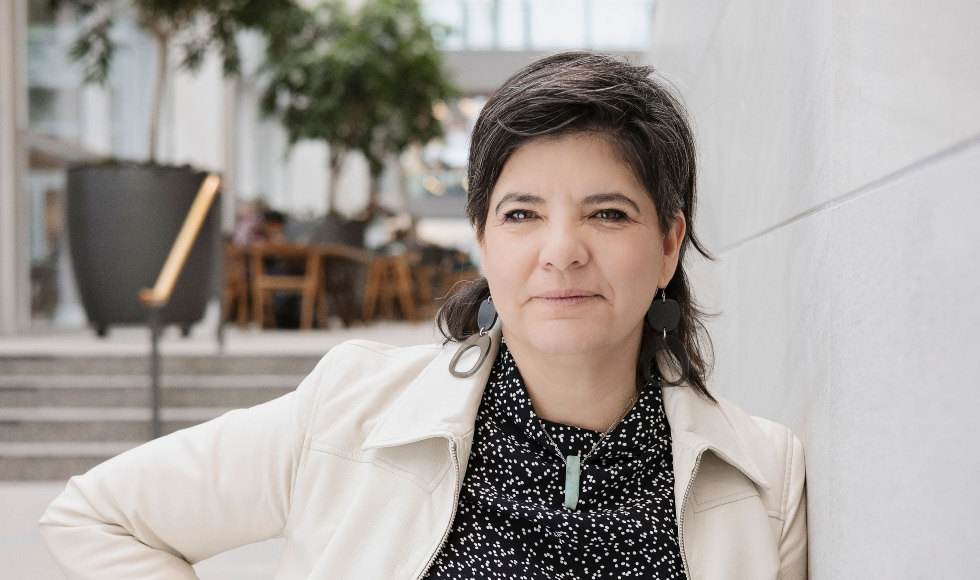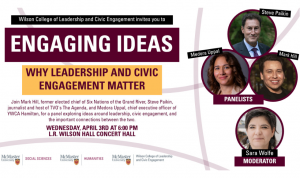Sara Wolfe named external director of Wilson College of Leadership and Civic Engagement

An executive leader and Indigenous advocate, Wolfe brings a range of experiences — from midwifery and health-care management to impact investing and inclusive governance — to her new role.
“I help people birth things. Sometimes it’s babies. Sometimes it’s ideas.”
Not many LinkedIn pages say that. But Sara Wolfe is a midwife and registered nurse turned impact investor and business consultant.
It’s that varied experience, from founder and developer of health-care practices informed by Indigenous knowledge and traditional practices to executive-in-residence at the Rotman School of Business at the University of Toronto, that Wolfe brings to her newest position: inaugural external director of McMaster’s Wilson College of Leadership and Civic Engagement.
A partnership between McMaster’s faculties of Humanities and Social Sciences, Wilson College was launched in September 2022 following a $50 million gift from chancellor emeritus L. R. “Red” Wilson with the goal of offering leadership-focused academic and community programming grounded in the liberal arts.
It will offer Canada’s only combined Bachelor of Arts in Leadership and Civic Studies, as well as support research and community activities.
As external director, Wolfe will oversee Wilson College’s external advisory council, which is made up of diverse leaders from the public, private and non-profit sectors and advises the College’s academic director and internal governing board.
To begin her tenure, Wolfe will be moderating a panel discussion on leadership and civic engagement as part of Wilson College’s inaugural public lecture on April 3.
The free event features journalist Steve Paikin, Six Nations’ former elected chief Mark Hill, and YWCA Hamilton CEO Medora Uppal. Click here to register.
 Engaging ideas: Wilson College’s first public lecture focuses on the importance of leadership
Engaging ideas: Wilson College’s first public lecture focuses on the importance of leadership
We chatted with Wolfe about her own leadership journey, and what she hoped to bring to Wilson College.
What do you think brought you to this place in your career?
Most of my work has been rather unconventional, and the way I got to where I am now was definitely not a predictable path — but it all connects when you hear the thread of the story.
Being raised by a residential school survivor [Wolfe is Anishnaabe from Brunswick House First Nation] has heavily informed my journey, even in terms of reconciliation with myself and understanding my own identity as an Indigenous person. That then became an invitation to reconnect to an understanding of the ways of being that my mom had, and led me on a journey grounded in community and culture.
I came to an understanding of my own responsibilities in the world — not to anything external, but to myself to use my talents, my experiences, my power and privilege, my connections and relationships, to have a positive impact on the world.
So my life has never been around what I do, but how I do it, and doing what was right.
I did an MBA because I wanted to have more skills for helping families who had been denied access and equity within healthcare – and then I started to understand the world as a larger system, and wanted to step into that larger system to have a similarly meaningful impact on a larger number of people and spaces that needed positive change.
I began to see how a lack of economic empowerment was one of the big obstacles to people being self-sufficient – and a lot of the health outcomes we were seeing downstream really could have been mitigated by people having the means to be self-sustaining.
I started to recognize this pattern of similar outcomes between the finance and economic space and health care. There are patterns to who experiences poor outcomes — equity is equity. Access is access, discrimination and racism are the same no matter what sector you’re in.
“I help people birth things” is such a great way to describe what you do. Can you talk a little about that idea?
I had a real identity crisis as I moved out of midwifery into the financial sector: If I’m not catching babies, who am I?
What I eventually realized was that by supporting economic empowerment, I was supporting people to conceive ideas, to gestate those ideas, to birth them, and then to help care for and parent those ideas as they grew into new businesses or enterprises or agencies.
We used to joke that I became the midwife of innovation!
The skills that I learned in midwifery are transferable to almost anything, because it’s really just about understanding what the process is and being able to facilitate and support them through that.
You know, when you tell an Elder you’re a midwife, the first thing they do is tell you creation stories — most different cultures and nations have their own creation stories. In Indigenous worldviews we are told that every time another person or another thing is born it’s a re-enactment of that first creation story — and that’s what helped me realize that I was still a midwife: I still understood the steps of creation.
You refer to creation stories — are there other Indigenous teachings that are particularly meaningful to you in the work that you do?
My mom was raised by her parents until she was five, and then she was taken — so she had some foundation in traditional teachings, but I wasn’t raised in the culture or the teachings as a traditional person.
I had to intentionally choose to embrace the culture, the traditions and the teachings, to go out and seek them. I still do, to this day – it’s something that makes sense to me intuitively, because it’s how I was intuitively raised by my mother, but practicing is something I have to do intentionally every day, and I have to choose to bring it into my life every day.
The things that resonate, in terms of what I have taken in through all that, is this idea of responsibility, relationality, and how all things are connected.
Even though I’m a midwife by background and I’m now in this leadership position, it’s that interconnectedness of all these different relationships, experiences and networks that I have that allow me to be in this place now.
The teachings also show us that things happen in cycles — and so I’ve been here before. I’ve been in this kind of role in a different way somewhere else. From being the oldest child in a family and leading a group of kids into the forest for a play activity to leading a group of midwives into opening a new kind of practice to now being the external director for Wilson College — it’s just a re-enactment, just like all creation, of that first creation story.
Speaking of Wilson College — you’re here at the beginning of the college, which is committed to approaching leadership in a different kind of way: from a community and civic perspective, not just that of an executive boardroom. Can you talk about that idea a little bit?
I think this is very needed in the world, and I think it’s very brave of McMaster to take this on as a challenge — there’s a formula for these kinds of initiatives that we’re not following, and that can be challenging. Leadership has always been prescribed as a very specific set of skills and personality types — and we’re now looking at all the different ways leadership can be envisioned, can be supported, can be taught, can be fostered, can be grown. It’s exciting for me to be here and supporting that.
Having an Indigenous person in this role is important, not because it’s an “Indigenous hire” that ticks off a diversity box, but because it shows that different kinds of leadership are valued — and that’s an invitation to other people to say, oh, maybe my kind of leadership can be recognized and valued too.
How do we get a kid like my daughter, who is quite shy but has great leadership potential, to see themselves as leaders, when society has reinforced this image of a leader as super outgoing and involved in everything? That’s going to be the big challenge for Wilson College — showing all the different ways a leader can be, and bringing all kinds of different voices and supporting skill building across all those different ways of leading.
What are some of the first things you want to do in this role?
The first thing I want to do is bring forward this idea that it’s not what we do, it’s how we do it — and how we do it can be informed by different ways of knowing and being in the world, and different world views and perspectives.
How do we form this phase of the work in a way that’s grounded in the land and has a connection to place and spirit — setting up the ceremonies and the beliefs and the “why” of what we’re doing, and really building relationships. I want to go into this brainstorming, visionary imagination space with a meaningful group of people who can imagine things in different ways and where all of us can hear those insights.
I love connecting with young people, because they call us on stuff that we should be paying attention to as leaders. The more we engage with them, the more we can position a world that they can step into more easily.
I’m also really excited to bring other faces like mine to the circle – not just other Indigenous leaders, but other thinkers, doers, people who are doing things in innovative, creative and unusual ways. I want to keep growing that community so people can see more and more how leadership can be lots of things.
We’re trying to create a better world for the next seven generations. We have a responsibility to those faces yet to come – we need to think about the impact and the legacy we want to leave, and that has to extend beyond our own lives.


